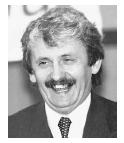SLOVAKIA
Mikuláš Dzurinda
Prime Minister

(pronounced "MI-ku-lash dzuh-RIN-dah")
"The basic precondition for a successful fulfillment of tasks that stand ahead of us is political stability. There is no time for artificial ideological conflicts."
Slovakia is located in Central Europe and shares its borders with five states: Austria, the Czech Republic, Hungary, Poland, and Ukraine. Its total area is 48,800 sq km (18,842 sq mi).
Slovakia's population was estimated at 5.4 million in July 2002. Approximately 86% of the people are Slovaks. Other nationalities include Hungarians (10.6%), the Roma (1.6%), Czechs, Moravians, Ruthenians, Ukrainians, Germans, Jews, Poles, and Croats. The official language is Slovak, but Hungarian is also somewhat widely used. The Slovak Constitution guarantees freedom of religion. Religious affiliation is 60% Roman Catholic, 10% atheist, 8% Protestant, 4% Orthodox, and 18% unidentified.
Despite a modern European economy and society, a large number of citizens live in rural areas. About 45% of Slovaks live in villages of less than 5,000 people, and 14% in villages of less than 1,000. Slovakia's currency is the Slovak koruna (Sk). Per capita gross domestic product (GDP) was about us$12,200 in 2002. That year, the unemployment rate stood at 17% of the workforce.
ADDRESS
Urad Vlady SR
Namestie Slobody 1
Bratislava, Slovakia